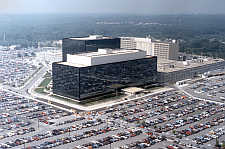 | « Back to article | Print this article |
 The Supreme Court agrees to give an urgent hearing to a PIL on the issue of US National Security Agency snooping on Internet data from India and seeking to initiate action against Internet companies for allowing the agency to access the information.
The Supreme Court agrees to give an urgent hearing to a PIL on the issue of US National Security Agency snooping on Internet data from India and seeking to initiate action against Internet companies for allowing the agency to access the information.
Agreeing to hear the PIL filed by a former Dean of Law Faculty of Delhi University Professor S N Singh, a bench of justices A K Patnaik and Ranjan Gogoi posted the case for hearing next week.
In his plea, Singh has alleged that such large-scale spying by the US authorities is detrimental to national security and urged the apex court to intervene in the matter.
He has claimed that the Internet companies are sharing information with the foreign authority in "breach" of contract and violation of right to privacy.
"As per reports, nine US-based Internet companies, operating in India through agreements signed with Indian users, shared 6.3 billion information/data with National Security Agency of US without express consent of Indian users.
Such large-scale spying by the USA authorities besides being against the privacy norms is also detrimental to national security," the petition, filed through advocate Virag Gupta, has said.
Singh has submitted that it is a breach of national security as government's official communications have come under US surveillance as services of private Internet firms are being used by them.
He has sought directions to the Centre to "take urgent steps to safeguard the government's sensitive Internet communications" which are being kept outside India in US servers and are "unlawfully intruded upon by US Intelligence Agencies through US-based Internet companies under secret surveillance program called PRISM".
IMAGE: National Security Agency headquarters in Fort Meade, Maryland.